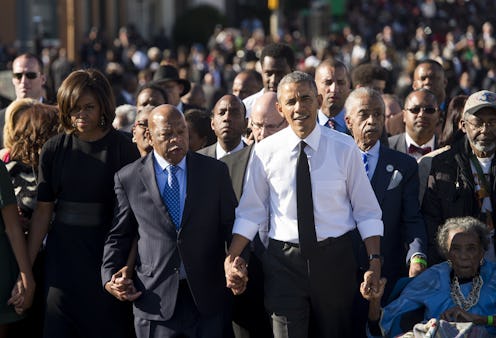News
7 Powerful Times John Lewis Wasn't "All Talk"

With less than a week from Inauguration Day, President-elect Donald Trump decided to continue his absurd Twitter wars. Venerated civil rights activist Rep. John Lewis of Georgia is Trump's latest Twitter target. The outspoken Lewis openly criticized Trump in an upcoming interview with NBC's Meet the Press, and the President-elect responded like how he responds to most criticism: blustered, rude and defensive.
According to NBC News, Lewis said he doesn't consider Trump "a legitimate president" because of news that Russian intelligence interfered with the presidential election for over a year. The alleged Russian security breach includes cyberattacks on the Democratic National Committee, which led to the WikiLeaks email dump of Hillary Clinton campaign chairman John Podesta.
"I think the Russians participated in helping this man get elected. And they helped destroy the candidacy of Hillary Clinton," Lewis told NBC's Meet the Press.
Trump, never missing a beat, responded Saturday morning with tweets directly addressing Lewis and his Congressional career. Trump tweeted that Lewis "should spend more time on fixing and helping his district, which is in horrible shape and falling apart...rather than falsely complaining about the election results."
"All talk, talk, talk - no action or results," Trump added about Lewis. And of course, Trump called Lewis and his comments, "Sad!"
This is not a good look for Trump, particularly because Lewis is emblematic of the Civil Rights movement, and especially on the day before Martin Luther King Jr.'s birthday. For nearly six decades, Lewis has embodied the term "activist" and has gotten some great results.
Here are seven times when Lewis wasn't "all talk," as Trump inaccurately claims, and instead fought for real change:
1Student Nonviolent Coordinating Committee
Lewis first made a name for himself as chairman of the Student Nonviolent Coordinating Committee from 1963-1966. He's known as one of the "Big Six" civil rights leaders — a group that includes his friend, Martin Luther King Jr. He was also the youngest of the "Big Six." During his SNCC tenure, Lewis organized the Mississippi Freedom Summer, a grassroots effort to register black voters in Mississippi. Voting rights was one of the most important issues for Lewis at the time, and many of his SNCC leadership duties focused on challenging voter discrimination laws.
2March From Selma To Montgomery
Lewis led roughly 600 people in an attempted march from Selma to Montgomery, Alabama, on March 7, 1965, to protest voter discrimination against black Americans. However, Lewis and his fellow marchers didn't get very far; police officers greeted them with batons and tear gas at the end of Selma's Edmund Pettus Bridge. After refusing to disperse, the officers attacked the Selma marchers, including Lewis. Lewis, then a young activist, suffered a fractured skull, but was able to testify at a federal hearing less than a week after "Bloody Sunday."
3Freedom Riders
Lewis was one of the original 13 Freedom Riders who, beginning in 1961, rode buses throughout the Deep South to protest ongoing (and unconstitutional) racial segregation on public buses. The Freedom Riders were violently attacked by white Americans, including members of the Ku Klux Klan, as well as police officers. In Anniston, Alabama, the bus carrying the Freedom Riders was bombed in a planned attack by Alabama police officers. The assault continued in Birmingham and Montgomery, where Lewis was beaten by both police officers and white civilians.
4Congress' Gun Reform Sit-In
Lewis, along with Rep. Katherine Clark of Massachusetts, led a Congressional sit-in following the Pulse shooting massacre in June 2016. Lewis organized the sit-in to protest gun laws in America, calling for tighter gun control measures at the federal level. Although the sit-in, which eventually included 170 Congresspeople, didn't immediately spark legislative action, Lewis was proud and hopeful. He later tweeted: "We got in trouble. We got in the way. Good trouble. Necessary Trouble. By sitting-in, we were really standing up."
5Anti-Iraq War March
In 2006, Lewis again led a huge march. This time, it was to protest the unpopular Iraq War under President George W. Bush. According to The New York Times, Lewis spoke to a crowd of 30,000 people in downtown Portland, Oregon. "'People around the world will not be inspired by our missiles and our guns; they will be inspired by our ideas," Lewis said.
6Darfur Genocide Protest
Lewis was arrested in 2009 while protesting in front of the Sudan embassy in Washington, D.C. Lewis was charged for misdemeanor trespassing after he crossed a police barricade. The Congressman was protesting the War in Darfur, a region of Sudan, and the brutal massacre of hundreds of thousands of civilians.
7Testimony Against Sen. Jeff Sessions
Just this week, Lewis, along with Sen. Corey Booker (D-N.J.), testified against Sen. Jeff Sessions, the Alabaman Trump wants to serve as U.S. attorney general. Sessions has a long history of making racially charged statements, including one known statement that seems sympathetic of the KKK. On Thursday, Lewis criticized Sessions and warned that his views would take America back half a century. "We've made progress but we're not there yet," Lewis said. "We don't want to go back. ... We need someone as attorney general who's going to look out for all of us."
So Donald Trump can try to criticize Lewis and say that he's "all talk" and "no action," but these seven examples (of many) prove otherwise.